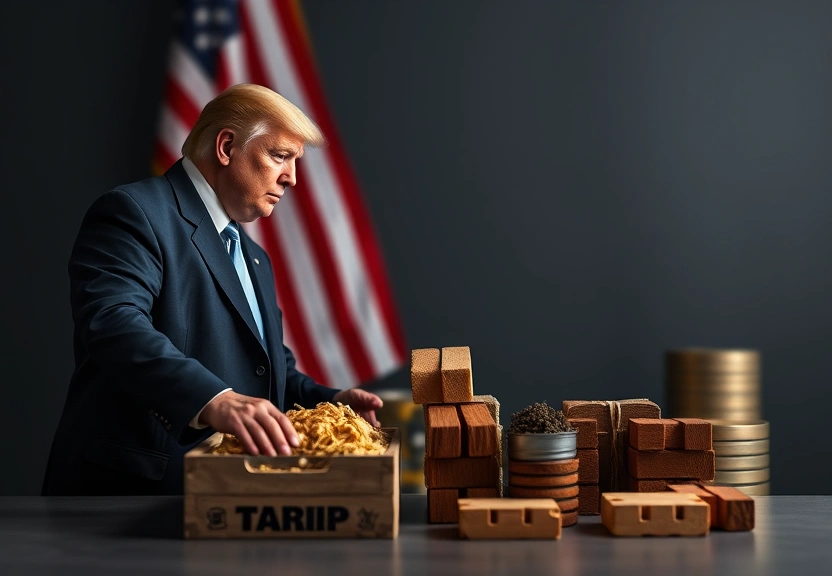How Trump’s Tariffs Could Unintentionally Benefit Americans: A Fair Approach
In recent years, the economic landscape of the United States has been significantly influenced by the tariffs implemented during Donald Trump’s presidency. While the immediate perception of these tariffs often leans toward negative ramifications—such as increased prices for consumers and strained international relations—there is a nuanced perspective that highlights potential benefits for American citizens. This article aims to explore how Trump’s tariffs, while initially seen as a protectionist measure, could inadvertently yield advantages for Americans through a more ethical and justified approach to trade.

In understanding this complex issue, it’s essential to dissect the framework of protectionism and ethical trade policies. By advocating for a clear and justifiable need for protection, we can align economic policy with the principles of fairness and equity. This article will delve into the intricacies of Trump’s tariffs, the rationale behind them, and how a well-structured policy could lead to unintended benefits for the American populace.
The Rationale Behind Trump’s Tariffs
Trump’s tariffs were primarily aimed at protecting American industries from what was perceived as unfair competition from foreign markets. With a focus on countries such as China, the administration sought to address trade imbalances that critics argued undermined domestic sectors. The idea was simple: by imposing tariffs on imported goods, the administration aimed to encourage consumers to purchase American-made products, thus stimulating local economies.
Understanding Tariffs as Economic Tools
Tariffs are essentially taxes imposed on imported goods, which can increase the price of these goods in the domestic market. The intention behind this action is to make American products more competitive in price. However, the effectiveness of this approach has been widely debated. While it can protect certain industries, it can also lead to increased costs for consumers and potential retaliation from foreign governments.
The Importance of a Fair Approach
The effectiveness of tariffs largely depends on their implementation. A fair approach to tariffs would involve a strategic assessment of which industries genuinely require protection due to unfair competition. This could mean focusing on sectors that are vital for national security or those that provide significant employment opportunities. By creating a well-defined policy that emphasizes ethical trade practices, the potential for positive outcomes could increase.
Potential Benefits of a Fair Tariff Policy
While tariffs can have negative implications, a carefully crafted tariff policy could yield several benefits for Americans. Here are some potential advantages:
- Job Creation: By protecting specific industries, tariffs could lead to job preservation and creation in sectors that are struggling against foreign competition.
- Increased Domestic Production: Tariffs can incentivize companies to invest in domestic manufacturing, reducing reliance on imports.
- Fair Competition: A fair approach can level the playing field for American businesses that face unfair practices from foreign competitors.
- Economic Growth: Stimulating local industries can lead to increased economic activity and growth, benefiting the overall economy.
- Consumer Awareness: Tariffs can promote an awareness of the importance of supporting local businesses among consumers.
Case Studies: Industries That Could Benefit
To understand the potential benefits of a fair tariff policy, it’s essential to look at specific industries that could see positive impacts. Here are a few examples:
Steel and Aluminum
The steel and aluminum industries have been at the forefront of tariff discussions. By imposing tariffs on imported steel and aluminum, the U.S. aimed to protect domestic manufacturers from cheaper foreign products. This protection could help revitalize these industries, leading to job creation and increased production capacity.
Textiles and Apparel
The textile industry has faced challenges from low-cost imports, which have driven many American manufacturers out of business. A carefully targeted tariff policy could support this sector by making imported textiles more expensive, thus encouraging consumers to buy American-made products.
The Role of Ethical Trade in Tariff Policy
Ethical trade practices play a crucial role in creating a fair and justifiable tariff policy. Instead of imposing blanket tariffs, an ethical framework would focus on transparency, sustainability, and equitable treatment of workers both domestically and abroad.
Promoting Sustainability
Incorporating sustainability into tariff policy means considering the environmental impact of imported goods. Tariffs could be levied on products that are associated with harmful production practices, encouraging companies to adopt greener methods.
Ensuring Fair Labor Practices
Another aspect of ethical trade is ensuring that products are made under fair labor conditions. Tariffs could be applied to goods produced in countries that do not adhere to labor rights standards, incentivizing better practices globally while protecting American workers.
Addressing Common Concerns
Despite the potential benefits, there are several concerns associated with tariffs and protectionist policies. Addressing these concerns is essential for a balanced understanding of the implications of Trump’s tariffs.
Increased Prices for Consumers
One of the most significant criticisms of tariffs is that they can lead to higher prices for consumers. When tariffs are imposed on imported goods, the increased costs often trickle down to consumers. However, if consumers are aware of the benefits of supporting local industries, they may be willing to pay a premium for American-made products.
Retaliation from Trade Partners
Another concern is the potential for retaliation from other countries. If the U.S. imposes tariffs, affected countries may respond with their own tariffs, which can escalate into trade wars. A fair and ethical approach to tariffs could help mitigate this risk by promoting dialogue and cooperation among trading partners.
FAQ Section
1. What are Trump’s tariffs?
Trump’s tariffs are taxes imposed on imported goods, primarily aimed at protecting American industries from foreign competition.
2. How could tariffs benefit Americans?
Tariffs could benefit Americans by protecting jobs, increasing domestic production, and promoting fair competition among businesses.
3. What is ethical trade?
Ethical trade refers to practices that promote fairness, sustainability, and respect for workers’ rights in the global supply chain.
4. Can tariffs lead to higher consumer prices?
Yes, tariffs can lead to higher prices for consumers as the costs of imported goods increase, but the trade-off may be the support of local industries.
5. How can a fair tariff policy be implemented?
A fair tariff policy can be implemented by assessing the specific needs of industries, promoting ethical trade practices, and fostering cooperation with trade partners.
Conclusion
While Trump’s tariffs have been controversial and criticized for their potential negative consequences, there is a possibility that they could unintentionally benefit Americans if framed within a fair and ethical approach. By focusing on the protection of vital industries, promoting sustainability, and ensuring fair labor practices, a well-structured tariff policy can lead to job creation, increased domestic production, and economic growth. As the U.S. continues to navigate the complexities of global trade, an emphasis on ethical trade practices and a fair approach to tariffs could pave the way for a more prosperous future for all Americans.
📰 Original Source
Este artigo foi baseado em informações de: https://www.marketwatch.com/story/this-question-could-change-the-course-of-trumps-trade-war-if-only-we-would-ask-it-b1f21d20?mod=mw_rss_topstories


